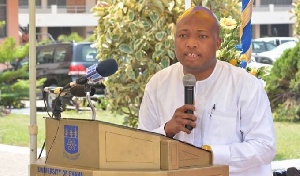The National Accreditation Board (NAB) is formulating new guidelines that will ban people from establishing arts-based universities in the country, Deputy Minister of Education in charge of Tertiary Samuel Okudzeto Ablakwa has said.
“We are not going to grant any accreditation if the school is not science-oriented, such as the Accra Institute of Technology (AIT),” he said at the 9th graduation ceremony of AIT in Accra.
This means that every university yet to be established should be science-based – meaning science and technology, medicine, engineering, pharmacy among others.
Arts programmes, otherwise known as humanities, dominate as the preferred programmes for students pursuing higher education in the country’s major universities -- putting the development of a skilled workforce in danger.
This is in sharp contrast to the Ministry of Education’s policy that mandates universities to admit 60 percent students into science programmes and 40 percent in humanities.
Data show that of the 127,502 students admitted into the eight public universities in the 2012/13 academic year, only 49,871 -- representing 39 percent -- pursued a science-oriented programme, with the remainder going into humanities.
Also, to guarantee that admitted students get to complete their chosen programmes, all new universities must show physical facilities, library facilities, proof of financial sustainability and governance system statutes to govern running the institution, as well as proof of affiliation.
New entrants will have to provide a financial guarantee by a bank, insurance company, or church to ensure completion for enrolled students in case the institution has financial difficulties.
It is widely speculated that institutions of higher learning in the country are shying away from science education provision, as it is costlier to do compared to providing arts education.
But the trend in university enrollment is now of grave concern to many development economists, who argue that the country’s development will be stalled as a result of skilled manpower shortage along with lack of technological and scientific knowledge, since this crop of skill-sets is the basis of providing critical personnel to man industries.
They further argue that the manufacturing sector in particular will suffer without the human capital required to propel it.
This is evident in the economy, with growth being driven mainly by the services sector as against manufacturing -- making the country uncompetitive in the global market because of lacking production for providing goods to be sold on the open market.
Regional News of Wednesday, 2 March 2016
Source: B&FT Online













